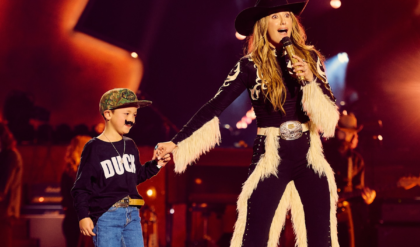In the pantheon of modern titans, Elon Musk stands as a colossus—architect of electric dreams at Tesla, pioneer of reusable rockets at SpaceX, and visionary behind ventures like Neuralink and xAI that probe the edges of human potential. With a net worth fluctuating around $300 billion as of October 2025, Musk isn’t just one of the richest men alive; he’s a symbol of audacious reinvention, the man who turned sci-fi into spreadsheets. But peel back the layers of headlines—launches that light up the night sky, Cybertrucks rolling off assembly lines, and tweets that sway markets—and you’ll find a deceptively simple secret at the core of his empire: the word “no.”
It’s not the bombastic “yes” to moonshots that defines Musk, though those grand affirmations grab the spotlight. It’s the quiet, unyielding “no” that guards the gate, a boundary as sharp as a Falcon 9’s trajectory. This isn’t mere anecdote; it’s philosophy forged in the fires of near-ruin. And who better to illuminate it than Justine Musk, the woman who shared his early chaos, bore his children, and watched from the front row as he built worlds? In a candid TEDx talk years after their 2008 divorce, Justine distilled Musk’s ascent to two pillars: grueling hard work and an ironclad ability to say “no.” “He said no a lot,” she reflected. “He said no to people who wanted his time and attention and energy. He said no in a way that protected his resources so that he could channel them toward his own goals.” Behind every refusal, she explained, lurks a deeper “yes”—to the audacious bets that redefine industries.
Justine’s insight cuts through the myth-making. Musk didn’t stumble into wealth; he engineered it by subtraction. In a world that bombards with opportunities—investors pitching deals, media craving soundbites, even family demanding presence—saying “no” isn’t rejection; it’s curation. It’s the entrepreneur’s scalpel, trimming the fat to reveal muscle. As Justine put it, children instinctively wield “no” as a shield for their autonomy, but adulthood often dulls that edge under societal pressure to please. Musk never lost it. He honed it into a weapon, one that preserved his finite energy for the infinite ambitions that propel humanity forward.
To grasp the stakes, rewind to the late 1990s, when Musk was no billionaire oracle but a scrappy coder with a Rolodex of big ideas. Born in South Africa in 1971, he immigrated to Canada at 17, then the U.S., scraping by on odd jobs before co-founding Zip2, a digital city guide that sold to Compaq for $307 million in 1999. Flush with $22 million, he launched X.com, an online bank that morphed into PayPal. eBay’s $1.5 billion acquisition in 2002 netted him $180 million. At 31, Musk was rich, restless, and ready to gamble it all. He funneled $100 million into SpaceX, dreaming of Mars colonization, and $70 million into Tesla, betting on electric cars when hybrids were the hot ticket. SolarCity, a solar energy startup founded by his cousins, gobbled up another chunk. By 2008, his fortune was a high-wire act, suspended over the abyss of the global financial crisis.
That year tested Musk like no other. SpaceX’s Falcon 1 rocket—a slender spear aimed at the stars—had failed spectacularly three times. Each launch drained millions, and with funding evaporating amid Wall Street’s meltdown, the company teetered on insolvency. “We had one last shot,” Musk later recounted. The fourth launch, on September 28, 2008, succeeded, docking with a dummy payload in orbit. Days later, NASA awarded SpaceX a $1.6 billion contract for cargo missions to the International Space Station. It was salvation, but only just. Without it, SpaceX would have folded, Musk’s Mars vision snuffed out.
Tesla fared worse. The Roadster, its debut sports car, wowed prototypes but production lagged. Suppliers balked, the economy cratered, and cash burned at $4 million a month. By December, Tesla had $3 million left—enough for two weeks of payroll. Musk, now chairman after ousting the CEO, poured in his last $40 million from PayPal proceeds. He sold his McLaren F1 supercar for a loss, maxed credit cards, and begged friends for loans to cover rent. “I was sleeping on the factory floor,” he admitted, “eating vending machine food.” Christmas Eve 2008: A $40 million funding round closed at 6 p.m., literally hours before checks would bounce. Daimler, Mercedes’ parent, soon chipped in $50 million for a 10% stake, sealing Tesla’s survival.
This wasn’t luck; it was “no” in action. Amid the panic, Musk turned down safe plays—diversifying into consulting gigs or cashing out early. He said “no” to despair, to half-measures, channeling every ounce of energy into all-nighters engineering fixes and pitches. Investors recall his laser focus: No tangents, no distractions. As Justine observed from their fracturing home—where she raised their five sons amid the turmoil—Musk’s “no” wasn’t rudeness; it was triage. He refused social invitations, sidelined non-essential hires, even deferred personal luxuries. “Your deep yes is your right to dream,” Justine said, but only if guarded by a “bright no” that marks where you end and the world begins. In 2008, that boundary saved two empires.
The dividends compound exponentially. Tesla, once a niche EV maker, scaled to 1.8 million vehicles annually by 2025, its market cap eclipsing $1 trillion. The Model 3 democratized electric driving, slashing battery costs 90% through relentless iteration. Musk’s “no” echoed here: He vetoed luxury-only pivots, insisting on mass-market affordability despite boardroom howls. SpaceX revolutionized rocketry with reusability—landing boosters like sci-fi darts—slashing launch costs from $200 million to under $30 million. Starship, its behemoth successor, eyes Mars by 2030. No to complacency; yes to vertical integration, from engines to software.
But Musk’s “no” extends beyond boardrooms. It’s a personal firewall. In interviews, he describes 100-hour weeks as non-negotiable, a regimen that divorces time for Netflix binges or beach vacations. “I could have sold Tesla in 2016 for $20 billion,” he tweeted in 2023, “but said no because the mission matters more.” Energy conservation isn’t laziness; it’s physics. Musk equates it to bandwidth: Finite cycles per second, allocated ruthlessly. No to yes-men; he demands dissent, firing executives who echo without challenge. No to work-life balance dogma; he argues true innovation demands imbalance, at least temporarily.
Critics, including Justine in her raw 2010 Marie Claire essay, paint a shadowed portrait. Their marriage, she wrote, withered under Musk’s alpha drive—he once quipped, “If you were my employee, I’d fire you”—prioritizing code over cribs. She felt sidelined, her writing dreams dimmed by his orbit. Yet even in hindsight, she credits his “no” for the breakthroughs that funded their family’s stability. “He worked harder than your average bear,” she said, but it was the refusals that amplified the effort. Today, at 53, Musk fathers 12 children across relationships, blending family with frenzy. His “no” to conventional parenting? Homeschool pods, AI tutors—unorthodox, but aligned with his vision of accelerating human progress.
This ethos ripples outward, inspiring a cadre of founders. Sara Blakely, Spanx billionaire, echoes it: “Saying no protects your yes.” Warren Buffett lives by “The difference between successful people and really successful people is that really successful people say no to almost everything.” Musk embodies the extreme: No to government bailouts (unlike GM in 2009), no to short-term profits that dilute mission. Tesla rejected subsidies early, betting on organic demand. SpaceX spurned Boeing’s dominance, undercutting with agility.
Yet, the power of “no” isn’t infallible. Musk’s boundaries have blurred into isolation—lawsuits from ex-employees decry burnout culture, and his 2022 Twitter (now X) acquisition, a $44 billion “yes” to free speech, ballooned into advertiser exodus and valuation dips. Vivian, his transgender daughter, publicly disavowed him in 2022, citing emotional absence. “No” safeguarded his empires but strained his inner circle. Justine, now a novelist thriving independently, views it philosophically: Boundaries aren’t walls; they’re moats, defending the castle without sealing it shut.
As of October 3, 2025, Musk’s empire hums at warp speed. Tesla’s Optimus robot nears factory deployment, SpaceX preps Starship’s orbital refueling, and xAI’s Grok challenges ChatGPT. Each milestone traces to that primal “no”—to mediocrity, to diffusion, to the gravitational pull of the ordinary. Justine’s clip, resurfacing in viral shorts, distills it: Hard work builds the rocket, but “no” launches it. In an era of infinite distractions—scrolling feeds, side hustles, FOMO-fueled yeses—Musk’s secret whispers a counterintuitive truth. To conquer worlds, first conquer your calendar. Say no, and the yeses will echo across the stars.
What if we’d heard more nos? No Zip2 sale, no PayPal pivot—perhaps no Musk mythos. But he chose yes to the impossible, fortified by no to the trivial. As he tweeted recently, “Production at scale is 100X harder than a prototype.” The garage genius is romantic; the disciplined denier is revolutionary. Justine’s lesson endures: Reclaim your “no,” unearth your deep yes, and who knows? You might just rewrite gravity.





